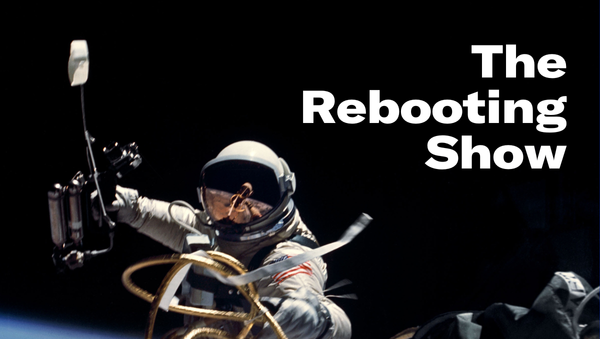Optimism


A new vertical video player for publishers

EX.CO’s new vertical video player for publishers has a first-of-its-kind, interactive, and intuitive UX, inspired by the video experience on social platforms that audiences know and love. It is a fully optimized vertical player, built for the open web - both mobile and desktop consumption. Showing comparable performance to EX.CO’s horizontal player from a monetization perspective, the new vertical player delivers 17% more video engagement than traditional horizontal players, on average and includes familiar swiping gesture controls so users can easily navigate between videos.
The case for optimism

The New Year is the perfect holiday. It’s celebrated by just about every culture and creed. And in a time of great division, we come together around the idea of a new year as a new start. And we probably need that at a time of pronounced pessimism that is causing my “Roaring ‘20s” prediction to not hold up.
The media business had one of its worst years in recent memory, and a fresh start is welcome. The year ended with a reminder of the difficult transition much of the media business is in as old models stop working. Cheddar was unloaded by Altice to a private-equity firm for only a possible future payment. This is after Altice spent $200 million on the streaming news network in 2019. BuzzFeed ended the year with the loss of both its CFO and president. This year isn’t looking much better, as it faces a $200 million debt payment, the prospect of unloading Complex Networks for about a third of what it paid back in the frothy days of 2021, and a market cap of just $39 million.
On the surface, newcomers aren’t faring much better. The Messenger ended 2023 with the departure of president Richard Beckman – and a plan to leave the business entirely. Not a great sign for a venture less than a year old. According to Semafor, things are so bad at The Messenger that its board considered shutting it down entirely, which The Messenger has denied. It has cut 20-odd jobs and is facing a restive staff who would understandably lose faith in management. I have friends there, and like anyone, I hate to see people lose their jobs. But The Messenger’s model, premised on big ComScore numbers and digital ads, never made much sense for the current environment.
Optimism doesn’t come naturally to the media business. Newsrooms are filled with skepticism that sometimes borders on cynicism. It’s a feature. Part of that is pattern matching. Self-proclaimed optimists are not always snake-oil salesmen, but snake-oil salesmen are nearly always self-proclaimed optimists.
Still there’s too little optimism in news coverage these days, reflecting these overall cultural currents. We are in a weird period where young people are less optimistic than old people, despite broad gains in average net worth by Americans under 35. The shortage of housing, climate change and toxic effects of social media outweigh all the quantitative evidence that most of us live in an age of abundance, despite the best efforts of the WSJ editorial board in pointing out how bad things were in the 1970s.
Visiting The Atlantic over the past few years has been a bracing experience, and even an avowedly optimistic brand like Wired has become mired in all the many things that are wrong about the present and what the future holds as we slip inexorably into a still-fuzzy AI era. Here’s how Om Malik, a veteran journalist turned investor, puts his critique:
It was a magazine that often gave us context for the future and all the technologies that were coming our way. It presented a scenario that inspired and gave us hope. Today, when you look through the magazine, it feels like just another run-of-the-mill magazine, that is focused on highlighting the dark side of technology and all the havoc it’s going to wreak on the world.
I don’t think you can divorce that negativity from the business prospects of the industry. Wired is part of Condé Nast, where the action used to be people watching at its famed cafeteria but now is home to union posters bashing the CEO in toilet stills. AI has largely been greeted with a mix of skepticism (warranted) and outright hostility (short-sighted) and playing aggressive defense (lawsuits and pleading for regulatory protection).
The media business itself has shrunk, and with it the ambitions of media companies. The realist view is that the future of much of the media business is smaller and less ambitious. As Puck’s Jon Kelly told me, trying to “own the waterfront” isn’t going to work now. Instead, in a time of expensive capital, sequencing is critical, as new publishers start with lightweight models like newsletters and growing iteratively from there. (My bet is the publishers called “newsletter companies” will all become indistinguishable from regular digital publishers in short order. The newsletter business is a niche phenomenon.)
We will continue to see the unwinding of old models, built on the premise of drawing visitors to webpages to show display ads. There’s no future in that. Even James Heckman, a longtime veteran of the pageview/digital ad game, is angling to recapture Sports Illustrated and shift away from reliance on advertising. The denouement of the third-party cookie saga is finally here. The long term impact of the change will take years to play out, but the short term disruption will add to the challenges of the simple fact that most publishers are seeing less traffic these days than they did.
The optimistic view of this is that new models are being built that go in different directions. Consider that Punchbowl celebrated its third anniversary. To me, it is a quintessential publishing venture of this era: narrowly focused on a high value area with a business model that mixes a protected ad category with events and subscriptions and now a data service. This is not just a lucrative model but a sustainable one. It is becoming the new formula, as SEO and “distributed” strategies once were.
Semafor is running a version of this playbook. CEO Justin Smith told my former colleague Kayleigh Barber that he aspires for events to be as much as half of the business. It was telling that Semafor reined in its ambitions prior to launch as the financial picture changed. Getting to profitability quickly is the new expectation – I’m even getting Instagram ads for EBITDA t-shirts. Semafor is claiming profitable months, which is a start.
Puck has its own version of this strategy, expanding cautiously by examining verticals for their dual-revenue potential. Last year, it added fashion by bringing on Lauren Sherman for spiky coverage of an industry that’s usually treated with kid gloves, and its newest foray is the sports business with longtime SBJ reporter John Ourand. This is a very smart move. The sports business is undergoing fascinating change, as it trades the cable bundle as subsidizer to streaming tech platforms – and teams build their own version of events businesses by turning venues into entertainment megaplexes.
Defector is showing the way to building a new type of publication that avoids many of the pitfalls of scale models where monetization invariably seeks the line between aggressive and desperate. Motherboard veterans are adopting a version of this playbook with 404 media, which has shown plenty of promise in its brief existence, even serving an essential role to host the Epstein court documents because even the most optimistic can’t hold out much hope for Pacer to work properly.
There are even some green shoots in local news.
This is not to say that there will not be more bad news, layoffs, closures, fire sales, cutbacks, flameouts, strikes and the rest. But there needs to be a growth agenda, and a growth mindset, for the business to chart a sustainable path. After all, pessimism can kill you.

Maybe you need a smaller boat?

Here’s a hard truth about marketing budgets: They can shrink, but expectations don’t shrink along with them. That means navigating the same waters with a smaller, faster boat—which is where we come in. Codeword helps some of the world’s biggest brands get more done with their marketing budgets, whatever they might be.
There’s a new normal out there. We can steer through it.
More optimism
On People vs Algorithms, Troy, Alex and I kicked off the year with a discussion of optimism, the coming year of legal and regulatory wrangling over AI and tech power, and our predictions and resolutions for 2024. Listen on Apple, Spotify or other podcast platforms.
Thanks for reading. Send me a note with your feedback: bmorrissey@therebooting.com.
Thanks to EX.CO and Codeword for supporting The Rebooting. Get in touch to work together.




